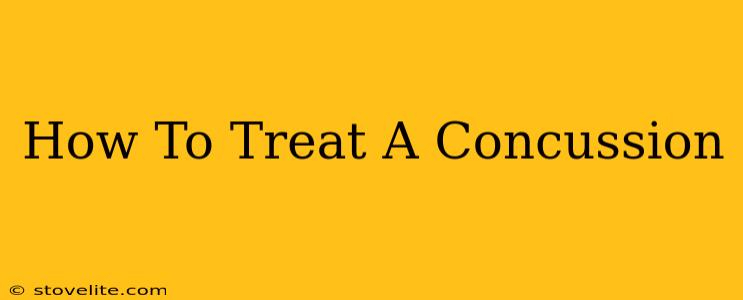A concussion is a type of traumatic brain injury (TBI) caused by a bump, blow, or jolt to the head or body that causes the brain to move rapidly back and forth inside the skull. This can result in a temporary disruption of brain function. Understanding how to treat a concussion is crucial for proper recovery and preventing long-term complications. This guide provides comprehensive information on concussion treatment, focusing on both immediate care and long-term management.
Immediate Steps After a Concussion
The first few hours and days after a concussion are critical. Prompt and appropriate action can significantly impact recovery time and outcome.
1. Seek Medical Attention:
This is paramount. Even seemingly minor head injuries require evaluation by a healthcare professional. They can assess the severity of the concussion and rule out more serious injuries. Don't delay seeking help. A doctor can perform a neurological examination, order imaging studies (if necessary), and provide personalized treatment recommendations.
2. Rest is Key:
Physical and cognitive rest are vital in the initial stages. This doesn't mean complete inactivity; rather, it involves avoiding strenuous activities, both physical and mental. Limit screen time (TV, computers, phones), reading, and demanding cognitive tasks. Gradual return to these activities should be guided by your healthcare provider.
3. Pain Management:
Over-the-counter pain relievers like acetaminophen (Tylenol) can help manage headaches. Avoid ibuprofen (Advil, Motrin) and naproxen (Aleve) as these can increase bleeding risk. Always consult your doctor before taking any medication.
4. Monitor Symptoms:
Keep a close watch for worsening symptoms. These can include:
- Headache: Persistent or worsening headache
- Dizziness: Feeling unsteady or lightheaded
- Nausea and Vomiting: Frequent or severe nausea and vomiting
- Sensitivity to Light and Sound: Photophobia and phonophobia
- Cognitive Difficulties: Problems with memory, concentration, or thinking clearly
- Sleep Disturbances: Difficulty sleeping or excessive sleeping
- Emotional Changes: Irritability, anxiety, or depression
If any of these symptoms worsen or new symptoms emerge, seek immediate medical attention.
Long-Term Concussion Management
Recovery from a concussion takes time and patience. Following your healthcare provider's recommendations is crucial for optimal healing.
1. Gradual Return to Activity:
This is a phased approach, guided by your doctor or physical therapist. It involves progressively increasing physical and cognitive activity levels while carefully monitoring symptoms. Rushing this process can lead to setbacks. This often includes a graded return to school and work.
2. Cognitive Rehabilitation:
For individuals experiencing persistent cognitive difficulties, cognitive rehabilitation therapy may be beneficial. This type of therapy aims to improve memory, attention, and other cognitive functions.
3. Physical Therapy:
Physical therapy can help address balance problems, dizziness, and other physical symptoms associated with concussion.
4. Mental Health Support:
Concussions can significantly impact mental health. Anxiety, depression, and irritability are common. Seeking support from a therapist or counselor can be incredibly helpful in managing these emotional challenges.
5. Lifestyle Modifications:
Making healthy lifestyle changes can support recovery. This might include:
- Getting enough sleep: Aim for 7-9 hours of quality sleep per night.
- Eating a healthy diet: A balanced diet provides the nutrients needed for brain repair.
- Managing stress: Stress can exacerbate symptoms; practicing stress-reducing techniques is essential.
When to Worry
Seek immediate medical attention if you experience:
- Loss of consciousness: Even a brief loss of consciousness warrants immediate evaluation.
- Seizures: Any seizure activity after a head injury requires emergency medical care.
- Worsening headache: A headache that gets progressively worse or is accompanied by other concerning symptoms.
- Vomiting: Persistent or forceful vomiting.
- Unequal pupil size: This indicates a possible brain injury requiring immediate medical intervention.
- Weakness or numbness: Weakness or numbness in any part of the body.
- Difficulty speaking or understanding speech: Problems with communication are warning signs.
Concussion recovery is a journey, not a race. Be patient with yourself, listen to your body, and follow your healthcare provider's recommendations. With appropriate care and support, most individuals make a full recovery. Remember, seeking early medical help is essential for optimal treatment and a faster recovery.

